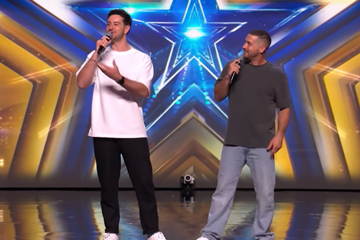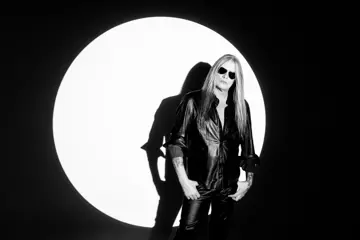Rocketman
★★★
At least it’s not Bohemian Rhapsody. With two ’70s-queer-icon rock-biopics served up in the space of six months — both, amazingly, directed by the same man, Dexter 'Spike from Press Gang’ Fletcher — it’s natural to compare them. Which is to Rocketman’s great fortune. This to-screen adaptation of the life and jams of Elton John is firmly ‘fine’, filled with rousing musical numbers and ridiculous flights of fantasy and a big-screen picture of an artist expressing their queerness through song and wardrobe.
Time and again, screenwriter Lee Hall (still best known for penning Billy Elliot) resists the glib morality and bland dialogue heard in Fletcher’s last rock flick. Instead, writer and director dream up varied ridiculous and surreal ways to tell the same old Walk Hard story.
A suicide attempt leads to emergency-room choreography; a performer and crowd levitate into the air by the power of rock’n’roll; the piano-player turns into a human rocket and launches into the sky, exploding in a spray of fireworks; a years-lost-in-a-whirlwind-of-drugs-and-touring montage is achieved by the camera spinning dizzying CGI circles around our hero performing at the piano; and John turns from boy to man midway into one song, hugs himself as a child (at the bottom of a watery abyss) in another, and ultimately confronts all the figures from his life in a final fantasy sequence of closure and acceptance, which plays a lot like Dewey Cox talking to his dead brother and father.
Don't miss a beat with our FREE daily newsletter
Sometimes, these fantasy-sequence flourishes and passing-of-time montages are artful, other times, they’re awful. But at least they’re never boring. And at least this queer icon actually gets to fuck someone. When he comes out — “I’m a homosexual, a poofter, a fairy, a queen” — his language carries none of the sidestepping that occurred in Bohemian Rhapsody. And Rocketman, benefitting again from the comparison, also doesn’t have any of the weird morality and punishment meted out by its straight-washed predecessor.
It’s also even-more-explicitly a musical. It begins, as all rock biopics must, with a backstage framing narrative from which our hero can think about their entire life before they play. But, yoink! It’s a cute inversion of this trope: our musical conqueror isn’t walking towards the stage at a big stadium show, but fleeing from it, off to a rehab group-therapy meeting, dressed in a demonic glam-rock get-up that makes him look like a cross between Maleficent and an Allen’s Sherbies wrapper. But, from there, we quickly leap back into a selectively decolourised 1950s suburbia, where Sir Elton is boyhood Reggie, strutting down cul-de-sacs, leading a troupe of dancers through a grand musical performance of The Bitch Is Back.
It’s clear from the start that the film has little interest in chronology, nor to be some 'behind-the-music’ chronicle of how the songs were made. Instead, it’s a classic rags-to-riches-to-downward-spiral-to-rehab-to-personal-peace tale told via song-and-dance numbers. There’s Crocodile Rock and Tiny Dancer and Saturday Night’s Alright (For Fighting) and Bennie & The Jets and Goodbye Yellow Brick Road and, of course, Rocket Man. It ends with I’m Still Standing, which is really the message.
For, if it’s not exactly a cautionary tale on the horrors of fame and ego and being victim to parasitic people shamelessly profiting off the ultra-profitable industry of one ridiculously-dressed man behind a piano, Rocketman is hardly an endorsement of the rock’n’roll life, either. It’s a musical as psychological study; which, here, mostly means there’s both mummy and daddy issues, duelling disapproving parents. There’s sequins and sell-outs, sad times and making “coked-out MOR shit”, public meltdowns and about three different lowest ebbs.
There’s also a ‘Flintstones Chewable Morphine’ loop of all the most over-determined and weighty lines from the film ringing in John’s confused mind; the pop-up head of naysaying Bryce Dallas Howard (seemingly only an on-screen mother, now) suggesting this trope isn’t being wheeled out with much seriousness. Someone says, “Who wants to go to a party at Mama Cass’s?” and said party involves fringed jackets and bandanas and denim bellbottoms on everyone. And near the end, John says “I started acting like a cunt in 1975, and just forgot to stop”, which is really the line you’ve been waiting to hear in nearly every Great Male Artist biopic ever made. They’re all cunts, Rocketman’s just okay with actually admitting it.
Godzilla: King Of The Monsters
★1/2
If a kaiju battle can be seen as some grand symbolic expression of a child watching their parents fight, Godzilla: King Of The Monsters takes that idea to its extreme. Here, Millie Bobby Brown plays a moody child-of-divorce. Her separated parents, Kyle Chandler and Vera Farmiga, are still squabbling, battling not only for their daughter’s affection, but for control of a device they once built together (symbolism alert!) that can communicate with the giant ‘titans’ who are this franchise’s battling monsters. In short, it’s effectively a custody battle with the fate of the world hanging in the balance, Brown bouncing between parents on opposing sides of a greater debate; Chandler thinking we should kill all the titans, Farmiga, seemingly, that we should let them kill us all.
This is an example of the comically-inept ways Michael Dougherty’s King Of The Monsters — an awful sequel to Gareth Edwards’ unexpectedly-artful 2014 Godzilla — tries to humanise a movie depicting carnage and destruction on an utterly inhuman scale. It’s another movie that gives you a suddenly-gung-ho deadbeat dad desperately trying to rescue his daughter no matter what, and audiences are supposed to care about the fate of this one person even though the film is depicting scenarios in which literally millions of people would die.
It’s (yet another) movie for people who love seeing CGI skylines razed, be it by giant monster or tsunami or nuclear blast. If you care about, I don’t know, characterisation or writing or the human condition, then best move along. As one of the many face-palmingly-stupid news reports herein puts it, the city-destroying events of the last film were “a historic tragedy that changed the world forever”. Yet King Of The Monsters makes its pile-up of death and destruction seem positively quaint in comparison; to the point where another one of the many face-palmingly-stupid news reports herein has to update the solemnly-intoned hyperbole: “This is the greatest disaster in human history.”
King Of The Monsters is, in all this grand-scale disaster and kaiju-on-kaiju battlin’, basically the sequel in which a whole bunch of other monsters show up. Five minutes in, Mothra is born, and starts killing people. Within half-an-hour, here comes King Ghidorah, ready to battle it out with the titular lizard. There are, it turns out, 17 of these giant creatures (and counting!), including one apparently found under Uluru (lol). There’s one that looks like a mammoth, a crab, a spider, a bird. There’s so many of them you could do with a field guide. Two monsters make a fight; at 17 it becomes a cacophonous royal rumble, with humans and narrative coherence both left in the dust.
The best moments in King Of The Monsters come when the film plays with silence or scale: as when we first see the titular creature, bioluminescent scales aglow, floating in the deep-sea abyss; or when Brown stands, a tiny human figure, dwarfed by the vast colossus who stands before her. But for the most part, the film barrels forward, throwing together tonally-mismatched moments into a disjointed, displeasing whole; effectively piling monsters on top of monsters, destruction on top of destruction. Bradley Whitford shows up solely to crack wise, but then there’s countless moments where people nobly sacrifice themselves to a cause, a sincere employment of a tired trope that Kong: Skull Island made fun of. Speaking of Kong, the credits deliver on the promise listed on future release sheets: in 2020, Godzilla Vs Kong will hit cinemas. Given how garbage this film is, we should anticipate a clash of the titans on par with Batman V Superman.















